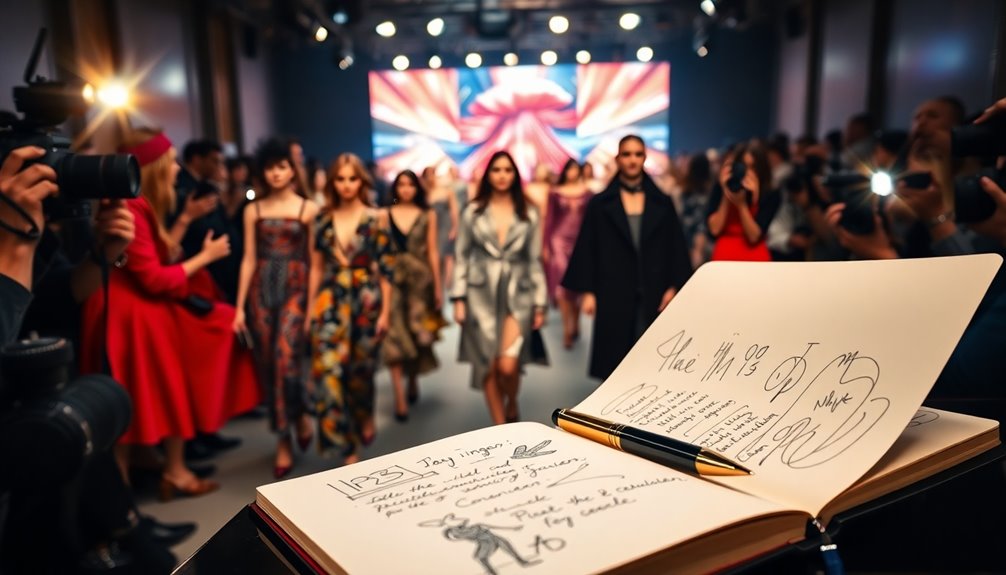If you can't find a fashion job or internship, don't get discouraged. Start by networking at industry events and connecting with professionals. Work on building a strong portfolio that showcases your best pieces; quality matters. Consider attending workshops to hone your skills and gain hands-on experience. Volunteering in the industry is another great way to meet people and learn more. Apply strategically to internships and leverage your college career center for resources. By actively engaging, you can create new opportunities. There's more you can do to enhance your pursuit of a fashion career, so keep exploring your options.
Key Takeaways
- Expand your network by attending industry events and engaging with professionals to discover hidden job opportunities.
- Enhance your portfolio by showcasing a diverse range of designs that tell a cohesive story.
- Utilize social media and fashion-related groups to connect with like-minded individuals and stay updated on openings.
- Volunteer for fashion shows or community projects to gain experience and make valuable industry contacts.
- Develop technical skills through workshops and mentorship programs to increase your employability in the fashion industry.
Leverage Your Network

You Can't Find a Fashion Job or Internship? This Is What You Can Do
Leverage Your Network
One of the most effective ways to land fashion jobs and internships is to leverage your network. Start by attending industry events like fashion shows, workshops, and parties. These gatherings provide a golden opportunity to meet key players in the fashion world. Networking is essential for breaking into the competitive fashion industry, so when you're there, don't hesitate to introduce yourself to everyone and express genuine interest in their roles. Additionally, machine learning algorithms can help analyze social media interactions to identify potential connections in the industry. After the event, follow up with those you met to maintain connections and build relationships.
Utilizing social media is another powerful tool. Create a strong online presence on platforms like Instagram, TikTok, and LinkedIn. Engage with brands and professionals, join fashion-related groups, and share your insights to establish authority.
Build a Strong Portfolio

A strong portfolio is essential for showcasing your unique design skills and creativity in the competitive fashion industry. Start by selecting and compiling your best work—gather outstanding fashion designs and sketches that display your versatility. Aim for a collection of 15 to 20 pieces across various categories, like evening gowns, casual wear, and accessories.
Next, organize and structure your portfolio. Arrange your designs in a logical order that tells a story, whether by theme, style, or chronology. Consider starting with casual wear, followed by formal attire and accessories. Clear headings and sections will make your portfolio easy to navigate.
Don't forget to include both technical and creative elements. Add technical drawings or flats to demonstrate your understanding of garment construction. Include detailed annotations alongside front and back views of your designs. Showcase mood boards, fabric swatches, and hand-drawn sketches to convey your design process. Furthermore, including unproduced designs can highlight your creativity and design thinking skills.
Finally, present high-quality visuals. Use professional photographs with proper lighting and composition, ideally showing garments on models or dress forms. Briefly introduce each project to provide context and inspiration.
A well-crafted portfolio can set you apart in your fashion job search.
Pursue Fashion Workshops

Participating in fashion workshops can significantly enhance your skills and industry knowledge, setting you up for success in the competitive fashion landscape.
These workshops offer valuable hands-on experience, allowing you to develop technical skills like pattern making and garment construction, or explore creative crafts such as leatherwork and fabric dyeing. You'll gain job-specific skills like creating tech packs and communicating effectively with factories. Additionally, many workshops are led by industry professionals, providing you with firsthand insights and expertise.
Led by industry professionals and alumni, workshops also provide insights into the fashion market, sustainability practices, and accessory design. You'll learn essential business acumen for creating a viable fashion brand, all while networking with other aspiring designers and established experts.
Structured programs, like the intensive 16-week courses at BKLYN Fashion Academy, dive deep into specialized topics and often include mentor sessions for personalized guidance.
Participation in themed workshops and runway shows will showcase your creations and help you stand out.
Keep in mind that some workshops have specific eligibility requirements, including age and prior experience.
Join Relevant Clubs

Joining relevant clubs can be a game-changer for your fashion career. These clubs provide invaluable networking opportunities with industry professionals and peers, making connections that can lead to internships and job offers.
Plus, membership often grants you access to exclusive events, workshops, and seminars where you can learn from the best in the business. Participating in fashion clubs also enhances your resume. Being an active member demonstrates your commitment and passion for the industry.
Whether you join a fashion design, marketing, photography, sustainable fashion, or technology club, you'll develop essential skills through hands-on projects and activities. Many clubs offer mentorship from experienced members, guiding you as you navigate your career path. Additionally, some clubs may organize clothing drives to support donations of current, in-style workplace clothing, aligning your passion with community service. Engaging in these clubs can also help you build your cultural intelligence, which is essential for success in the global fashion market.
To find and join clubs, research local colleges and universities with fashion programs or check online platforms and social media for announcements. Attend fashion events to meet club members, and don't hesitate to reach out to club leaders for membership information. Engage actively in club meetings and events to determine which club aligns best with your interests and goals.
Embrace the opportunities these clubs provide, and watch your fashion career flourish!
Volunteer in the Industry

Volunteering in the fashion industry opens doors to invaluable experiences and connections that can significantly boost your career. By assisting in fashion shows, you can dive into the dynamic world of runway events. You'll help backstage with clothing changes and model dressing, ensuring everything runs smoothly. This hands-on experience isn't only exciting but also allows you to interact with designers and industry professionals. Additionally, volunteering fosters sustainability and positive change in the fashion industry, making your contributions even more impactful.
You can also volunteer with fashion brands or textile manufacturers. By collaborating on fabric research or sustainable projects, you'll gain insights into the creative processes behind fashion. Tasks in local boutiques or participation in marketing campaigns can further enhance your skill set.
Additionally, working with nonprofit organizations focused on sustainable fashion gives you the chance to make a positive impact. You can participate in clothing drives or teach fashion workshops to local youth, amplifying your community engagement.
Don't forget to leverage online platforms and networking opportunities. Websites like VolunteerMatch can help you find roles, while attending local fashion events can lead to valuable connections.
Apply for Internships Strategically

Finding internships in the fashion industry can be a game changer for your career. To maximize your chances, start by identifying relevant departments and companies that pique your interest. Whether it's buying, merchandising, or design, focus on where your talents align.
Research companies and fashion designers for available internships, checking their websites and social media for application details. Don't hesitate to reach out to recruiters for insights on openings.
Utilize your educational resources, like career fairs and school connections. Networking with professors and alumni can yield valuable internship leads. Make sure to leverage your college's career center for assistance with your resume and cover letter.
Prepare your application materials carefully. Create a fashion portfolio that showcases your best work, develop a professional resume, and craft a tailored cover letter that highlights your passion for the industry. Engaging in volunteering at fashion events can also open doors to potential internships.
Finally, don't forget to network and apply early. Use platforms like LinkedIn and Handshake to connect with industry professionals and discover job opportunities. By staying proactive and demonstrating your industry knowledge, you'll set yourself apart from the competition.
Maintain Professional Relationships

In the fast-paced fashion industry, maintaining professional relationships is crucial for advancing your career. Start by building a solid network of contacts. Attend fashion shows, industry events, and workshops to meet photographers, designers, and stylists. Use social media platforms like Instagram and LinkedIn to connect with these professionals and join fashion-related groups to interact with like-minded individuals.
Creating genuine connections goes beyond merely exchanging business cards. Stay in touch with your contacts, follow up after events, and express real interest in their work. Focus on quality over quantity when building relationships, engaging in meaningful communication, and sharing valuable resources. True networking stems from genuine interest in others' stories and experiences, which will further deepen your connections.
Leverage social media to enhance your networking efforts. Showcase your modeling skills and stay updated on industry trends. Engage with industry professionals by liking, commenting, and sharing their content.
Finally, nurture long-term partnerships by collaborating with others in the industry. Reach out to potential mentors for guidance and propose mutually beneficial projects. Regularly communicate with collaborators to maintain strong relationships, ensuring that you all grow and learn together in this competitive field.
Frequently Asked Questions
How Do I Choose the Right Fashion Internship for My Career Goals?
To choose the right fashion internship for your career goals, start by evaluating your talents and interests.
Research different departments like design, merchandising, or e-commerce, and align them with your aspirations.
Browse company websites for opportunities, and reach out directly if needed.
Set specific, achievable goals related to the internship, and network with industry professionals for guidance.
This approach will help you find an internship that truly fits your career path.
What Skills Are Most In-Demand in the Fashion Industry Today?
In today's fashion industry, skills in digital tools are crucial.
You'll want to master software like CLO 3D and Adobe Creative Suite for design, along with AI platforms for trend analysis.
Social media savvy is essential, too; knowing how to engage audiences on platforms like Instagram can set you apart.
Lastly, understanding sustainability and ethical practices is increasingly important, as consumers demand transparency and responsibility from brands.
Embrace these skills to thrive!
How Can I Effectively Follow up After Networking Events?
After networking events, follow up promptly to maintain the connection.
Within 24 hours, send a thank-you message, referencing your conversation. Use WhatsApp for casual chats or email for more formal communication.
If you don't hear back within a week, send a polite reminder.
Stay consistent with your follow-ups over the next few months, sharing valuable content and engaging on social media to reinforce your relationship and explore future opportunities.
What Should I Include in a Fashion Resume or CV?
When crafting your fashion resume or CV, tailor it to each specific job. Highlight relevant education, like fashion courses or certifications, and include any related work experience, even if minor.
Focus on skills that match the job description and use strong metrics to showcase achievements.
Don't forget to incorporate creative design elements that reflect your personal style. Make your resume visually appealing while emphasizing your unique aesthetic sensibility and design philosophy.
How Do I Handle Rejection After Applying for Internships?
When handling rejection after applying for internships, start by thanking the employer for their consideration.
Express your interest in future opportunities, keeping the door open for potential connections.
Give yourself time to process your feelings, but don't take it personally.
Reflect on the experience to identify areas for improvement, and consider seeking feedback.
Stay positive, celebrate your achievements, and remember that the right opportunity will come along with persistence and patience.
Conclusion
Finding a fashion job or internship can feel daunting, but you’ve got the tools to make it happen. By leveraging your network, building a standout portfolio, and getting involved in workshops and clubs, you’ll open doors to new opportunities. Volunteering and applying strategically can also give you that extra edge. Remember, maintaining professional relationships is key to long-term success. Stay proactive, keep refining your skills, and you’ll be well on your way to landing that dream role in fashion! Consider reaching out to industry professionals for informational interviews and advice on breaking into the fashion industry. Keep an eye out for job opportunities in fashion industry trade publications and websites, and make sure to tailor your application materials to each specific role you apply for. By staying persistent and keeping an open mind, you can increase your chances of securing a rewarding position in the fashion world. Remember, every experience and connection counts in this competitive industry.









